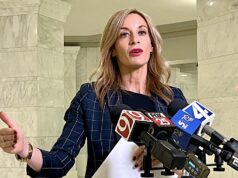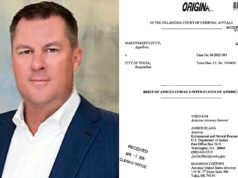Supporters of State Question 820’s proposal to legalize marijuana for recreational use say the Secretary of State’s Office “dropped the ball” with its new signature verification process, which took weeks longer than prior verification efforts. As a result, proponents are asking the Oklahoma Supreme Court to expedite approval of the ballot title so the State Election Board can print SQ 820 ballots for November’s general election. A hearing before the court is set for 10:30 a.m. Friday.
Despite supporters gathering more than 164,000 signatures for the initiative petition, SQ 820 may not find its way to a ballot this year owing to a series of deadline requirements and the lengthy new process that verified 117,000 of the signatures, which is more than the required number.
SQ 820 would allow adults age 21 and up to legally purchase marijuana from dispensaries without a medical license. It would not alter the rights of those currently in the state’s medical marijuana program.
It would also impose a 15 percent excise tax on purchases, which would be dedicated to help fund the Oklahoma Medical Marijuana Authority. That tax would also be divided up in several other ways, including some funds for schools, court systems and drug-addiction treatment programs. Medical marijuana patients would not be subject to that tax.
SQ 820 would also provide judicial process for people to seek “modification, reversal, re-designation, or expungement of certain prior marijuana related judgments and sentences.” Supporters call that component an important step for Oklahoma’s criminal justice system.
The Secretary of State’s Office recently contracted with Western Petition Systems to verify the signatures. The agreement pays the company, founded by longtime Oklahoma political pollster Bill Shapard, $300,000 per year.
This is the first time the state has used a third-party contractor to verify petition signatures. SQ 820 organizer Michelle Tilley said the verification process took longer than it has in the past.
“The new process took about 48 days from the time we turned in our signatures until the time they were verified,” Tilley said. “In the past, that was usually about two weeks or a little longer. It’s been a new process for them, which has caused a lot of missteps along the way. They have dropped the ball, which is why we have asked the Supreme Court to intervene.”
The elongated verification period means SQ 820 appears unlikely to qualify for the November ballot unless the court expedites the ballot title verification process, which involves a 10-day challenge period. Tilley said she has been told the state will start printing ballots Friday, and the 10-day challenge period would end just after that.
As a result, Tilley’s group has asked the Oklahoma Supreme Court to require SQ 820 ballots to be printed before the challenge period ends.
“We’re asking them to print the ballots so we can finish out the process,” Tilley said. “We feel very strongly that this is an arbitrary deadline and that they should follow what the law says.”
According to Oklahoma law, if sufficient valid signatures are verified for an initiative petition, that state question must be put on the ballot in the next statewide election, unless a special election is called prior to that election.
In their court filing, SQ 820 organizers highlighted Article V, Section 3 of the Oklahoma Constitution:
Article V, Section 3 of the Oklahoma Constitution makes clear that, if an initiative petition is signed by the requisite number of Oklahoma voters, it “shall” be submitted to a vote of the people “at the next election held throughout the state.” This constitutional mandate provides for only one exception: when the governor calls an earlier special election for the initiative. Here, proponents submitted an initiative petition signed by the requisite number of voters more than four months before the next general election, and no special election has been called. Nevertheless, the Election Board refuses to commit to placing the initiative on the next general election ballot unless the governor says so. What’s worse, the reason the Election Board offers for its refusal to comply with the plain text of the Constitution is an alleged time crunch — a time crunch created entirely by the government’s own inefficiency.
SQ 820 organizers seek ballot title approval
Oklahoma City attorney Ryan Kiesel has served as an advisor for the SQ 820 campaign. Kiesel, an attorney and former member of the Oklahoma House of Representatives, said he believes the petition before the Supreme Court makes a compelling legal argument.
“I’m biased, but I think the brief we submitted to the court makes a very persuasive case,” Kiesel said. “At first glance, the relief that we’re requesting seems extraordinary, but when you really start to unpack the argument that our counsel marshaled in application for the writ, you see that there is precedent for it. What we’re asking is consistent with the Constitution and statutes.”
SQ 820 organizers are asking the court to approve the ballot title so that ballots can be printed. Ballot titles are what the voter sees on a ballot. They describe state questions to the voters and are sometimes referred to as ballot language.
“One of the things we’re asking the court to do is immediately resolve any issues with the ballot title,” Kiesel said. “So the court has the ultimate authority under law to determine what is or what is not a sufficient ballot title. The attorney general has rewritten the ballot title. The 820 campaign feels like the attorney general’s rewritten ballot title is fair and acceptable. So the court has our initial ballot title. They have the attorney general’s ballot title. And the court can select ours — which we’re not necessarily asking them to do. We’re asking them to adopt the attorney general’s, or they can draft a ballot title of their own. But we’re asking the court to make that determination as soon as possible.”
Kiesel said if the ballot title is approved, then ballots can be printed.
“Once the court has said this is what the ballot title is, then the Election Board should print State Question 820 ballots and do that in a way that allows the Election Board to comply with their statutory obligation of sending absentee ballots no later than 45 days before the election,” he said.
With the general election set for Nov. 8, absentee ballots would need to be mailed no later than Sept. 24. But the deadline to print ballots set by the Secretary of State is arbitrary, Kiesel argued.
“Our belief is that it is not set in law,” Kiesel said of the printing deadline. “There’s nothing binding the election board to print ballots at that time.”
Jeffrey Cartmell, an attorney for the Oklahoma Secretary of State’s Office, said the new process of verifying signatures differs from years past.
“For the first time in memory, if not the history of our state, a true signature verification process for an initiative petition occurred, and only signatories that were registered voters were counted,” Cartmell wrote in an email to NonDoc. “This new process differs significantly from the historical practice of merely counting the number of individuals who signed the petition without regard for their voter registration status. Our office has been in constant communication with the proponents and we look forward to working with them and other interested parties as we continue to improve this new process.”
Cartmell declined to comment on the state’s satisfaction with Western Petition System’s performance during the verification process.
“As a matter of practice, any performance related discussions will occur directly with a vendor and not through intermediaries or the media,” he said.
Shapard, the owner of the Western Petition Systems, did not respond to a message seeking comment prior to the publication of this story.
Arkansas effort also tied up in court
Similar battles have played out elsewhere. In neighboring Arkansas, a pro-legalization group gathered more than 190,000 signatures to put a question about legalizing marijuana on the ballot in Arkansas this fall. But the State Board of Election Commissioners initially declined to certify the question because of what it said was misleading ballot language.
The Arkansas State Supreme Court later ruled that organizers had used the correct ballot language and that the question should appear provisionally on the ballot in November. That court will decide later if the votes should actually be counted.
Kiesel said Oklahoma’s situation is similar.
“The best comparison to draw may be not a carbon copy of what is happening in Arkansas, but I think it does demonstrate to our court — to our policy makers — that there are ways to account for outstanding challenges and outstanding protests but still come up with a plan to make sure the voters in Arkansas get to vote on their ballot measure,” Kiesel said.
What happens if SQ 820 is not up in November
For Tilley and those who gathered the signatures, Oklahoma’s initiative petition process is sacred. Tilley cited recent petitions that legalized medical marijuana and Medicaid expansion as opportunities Oklahomans have had to weigh in on important issues.
“Oklahoma was founded as a populist state because we wanted to keep as much power in the people’s hands as possible,” she said. “And Oklahomans have used that right on several things in the past, like Medicaid expansion and raising funds for education. It’s a very important part of our heritage as a state, and while some people think it’s overused or used all the time, the reality is there have been only a handful (of questions) that have made it to a ballot.”
Gov. Kevin Stitt is charged with calling elections once a state question’s challenge period ends. When asked if Stitt and others might want to keep the state question off the November ballot for political purposes, Tilley said the effort to gather the signatures included an array of people with different political beliefs.
In 2018, when SQ 788 was on the ballot, Oklahoma saw higher voter turnout, and that could be the case again whenever SQ 820 appears before voters.
“All I can say is that the people who signed the petitions and the people who gathered the signatures were Republicans and Democrats and independents,” she said. “This is not a partisan issue. I think people would be surprised at the number of people from all different political persuasions who came together to make this happen. There are people who worked side by side on this who probably wouldn’t agree on much else.”
Kate Vesper, a spokesperson for Stitt, said the governor has made no effort to keep SQ 820 off the ballot for political reasons.
“The suggestion that the governor attempted to interfere with the statutorily-required duties of the Secretary of State’s office is inaccurate and absurd,” Vesper said in a statement.
Tilley said if SQ 820 doesn’t make it on November’s ballot, it could be two years before the next statewide election, unless a special election is called. The group would not have to repeat the process of gathering signatures, but Tilley said it would be a loss for the state.
“People are ready to vote on this now, and when people signed they did so with the expectation they would be able to vote on it in the next election,” Tilley said. “And also, if we have to wait, the state will be missing out on two years of tax revenue, which is also a huge loss.”






















